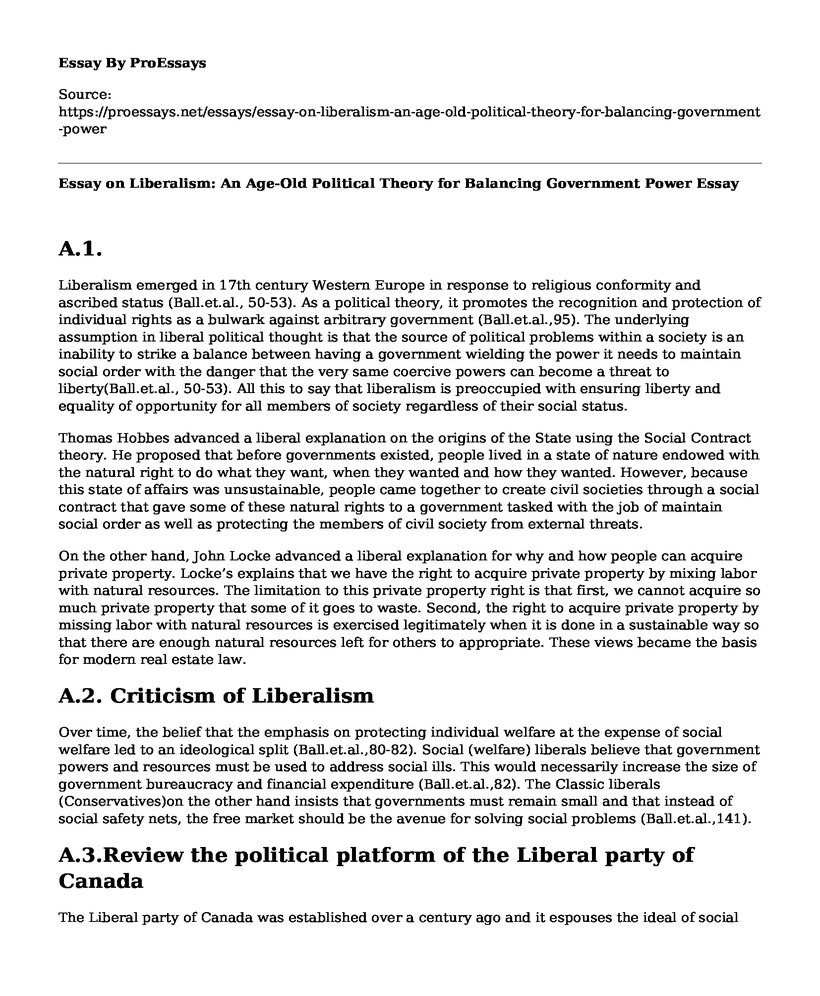A.1.
Liberalism emerged in 17th century Western Europe in response to religious conformity and ascribed status (Ball.et.al., 50-53). As a political theory, it promotes the recognition and protection of individual rights as a bulwark against arbitrary government (Ball.et.al.,95). The underlying assumption in liberal political thought is that the source of political problems within a society is an inability to strike a balance between having a government wielding the power it needs to maintain social order with the danger that the very same coercive powers can become a threat to liberty(Ball.et.al., 50-53). All this to say that liberalism is preoccupied with ensuring liberty and equality of opportunity for all members of society regardless of their social status.
Thomas Hobbes advanced a liberal explanation on the origins of the State using the Social Contract theory. He proposed that before governments existed, people lived in a state of nature endowed with the natural right to do what they want, when they wanted and how they wanted. However, because this state of affairs was unsustainable, people came together to create civil societies through a social contract that gave some of these natural rights to a government tasked with the job of maintain social order as well as protecting the members of civil society from external threats.
On the other hand, John Locke advanced a liberal explanation for why and how people can acquire private property. Locke’s explains that we have the right to acquire private property by mixing labor with natural resources. The limitation to this private property right is that first, we cannot acquire so much private property that some of it goes to waste. Second, the right to acquire private property by missing labor with natural resources is exercised legitimately when it is done in a sustainable way so that there are enough natural resources left for others to appropriate. These views became the basis for modern real estate law.
A.2. Criticism of Liberalism
Over time, the belief that the emphasis on protecting individual welfare at the expense of social welfare led to an ideological split (Ball.et.al.,80-82). Social (welfare) liberals believe that government powers and resources must be used to address social ills. This would necessarily increase the size of government bureaucracy and financial expenditure (Ball.et.al.,82). The Classic liberals (Conservatives)on the other hand insists that governments must remain small and that instead of social safety nets, the free market should be the avenue for solving social problems (Ball.et.al.,141).
A.3.Review the political platform of the Liberal party of Canada
The Liberal party of Canada was established over a century ago and it espouses the ideal of social liberalism. Hence, their party platform supports taxpayer funded welfare programs for the most economically vulnerable people in Canadian society. More evidence of the party’s social liberal inclinations was its successful campaign to legalize same sex marriages in Canada while the Classical liberals in the Conservative party opposed them every step of the way.
Work Cited
Ball, Terence, Richard Dagger, and Daniel I. O’Neill. Political ideologies and the democratic ideal. Taylor & Francis, 2016.
Cite this page
Essay on Liberalism: An Age-Old Political Theory for Balancing Government Power. (2023, Aug 08). Retrieved from https://proessays.net/essays/essay-on-liberalism-an-age-old-political-theory-for-balancing-government-power
If you are the original author of this essay and no longer wish to have it published on the ProEssays website, please click below to request its removal:
- Research Paper on American Jury System
- How the Constitution Changed the Articles of Confederation - Essay Sample
- Foreign Policy - Essay Sample
- Research Paper on Aaron Burr's Role in Passing 12th Amendment to US Constitution
- Article Analysis Essay on 'The International Indigenous Policy Journal'
- Paper Sample on Review of Murder State: Chapter 5 - Democratic Death Squads of Northern California
- Freedom as a Conscious Choice: Exploring Hannah Arendt's Perspective on Liberty and Responsibility







